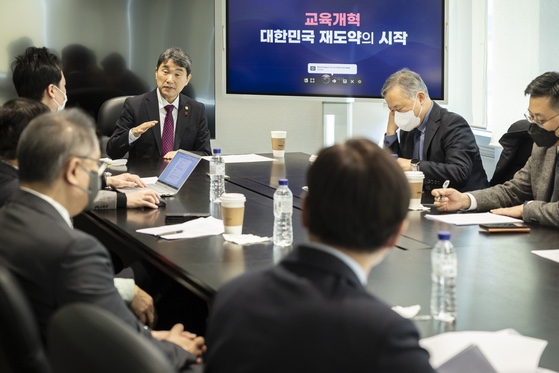

A conference on education reform is being held by the Minister of Education @The JoongAng
Since 2025, the Korean government has been encouraging universities to expand liberal studies programs as a way to nurture interdisciplinary talent. Following a strong push from the Ministry of Education, universities nationwide are now working to broaden their liberal studies programs.
However, problems arising from the Ministry of Education’s system are gradually becoming apparent. One notable issue is the concentration of students in certain majors. Students are gravitating towards popular fields such as Computer Science and Business Administration, mainly due to concerns about employment prospects and wider social pressures. This trend runs counter to the original goal of fostering multi-skilled professionals. Another issue arising from too many students choosing the same majors is that regional universities struggle to maintain academic diversity. With a shortage of students—partly due to Korea’s low birth rate—some universities are merging or abolishing less popular majors. Especially at Daegu University in Gyeongsangbuk-do, a symbolic funeral was even held for the closing Department of Sociology, which was closed due to enrollment cuts and academic restructuring. Cases like this highlight the declining social and student demand for fundamental disciplines, which are now increasingly at risk of being abolished.
Ultimately, expanding liberal studies alone has a limited effect on fostering disciplinary convergence and increasing the diversity of students’ major selections. On April 16, 2025, the Seoul National University Faculty Council unusually issued a statement highlighting problems in Korea’s education system from past to present and proposing alternative educational reforms. The proposed reforms include bold and controversial ideas. One is to restructure the education system into a six-year integrated middle and high school program. This would allow students to maintain focus without interrupting the process of discovering their interests and aptitudes. Another proposal is to offer the CSAT multiple times a year— similar to the SAT in the United States. From the perspective that this could reduce pressure on Korea’s students and give them more opportunities to demonstrate their abilities, the idea seems worth considering. Additionally, a proposed joint degree program with regional universities aims to close the gap in research and education quality between universities in Seoul and those in other regions. This gap is seen as a key factor in the regional differences in students’ educational outcomes. With many students choosing universities in Seoul, this program provides a good solution in preventing the decline of regional universities, helping to enhance overall quality of education.
Korea’s education system has undergone significant changes in recent times, often causing confusion depending on the government’s approach to education. For the future of education in South Korea, calls for educational reform are growing and extending beyond the mere expansion of liberal studies.
Reporter
Jaeho Lim
limjaeho4119@seoultech.ac.kr


 Comment 0
Comment 0 Posts containing profanity or personal attacks will be deleted
Posts containing profanity or personal attacks will be deleted